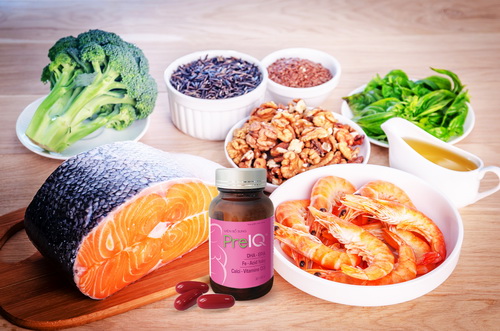If you have ever experienced the process of raising young children, you will be familiar with the concept of DHA supplements.
If you have ever experienced the process of raising young children, you will be familiar with the concept of DHA supplements. Most prenatal nutritional supplements are advertised for an omega-3 fatty acid called DHA. But few of us know that, despite decades of research, the evidence that DHA in formula helps enhance brain development in children is unclear. And the need for mothers to supplement DHA during pregnancy is not necessarily a necessary indication.
Why is DHA added to nutritional foods?
DHA’s full name is Docosa Hexaenoic Acid, a fatty acid in the omega-3 group. In addition, this group also includes DHA precursors, which are alpha-linolenic acid (ALA) and eicosapentaenoic acid (EPA). In addition, there is also the unsaturated omega-6 fatty acid (arachidonic acid-AA). DHA is a very important substance but the body cannot synthesize it itself and must be taken in from food sources. DHA is necessary for the development of the nervous system, especially the development of complete vision function. In children, DHA plays a role in enhancing intelligence. In adults, it has the effect of reducing blood triglycerides and bad cholesterol, helping to prevent atherosclerosis and myocardial infarction. During pregnancy and the first years of life, DHA accumulates in the brain, retina of the eye and plays an important role in the development of the nervous system and vision. Breast milk contains DHA in different concentrations, depending on the amount of fat in the mother’s diet. Some strains of DHA can also be produced in the body from precursor omega-3 fatty acids, although this process appears to be less efficient.

DHA should be supplemented from food sources.
Studies from the 1990s showed that infant formula had lower levels of DHA than breast milk, and suggested that DHA supplementation could improve cognitive and visual development. In 2002, the results were convincing enough for the U.S. Food and Drug Administration to approve DHA supplementation of infant formula. Today, all major brands of formula sold in the U.S. contain DHA, often in the form of purified oil derived from algae, an added ingredient that increases the cost of the formula.
The Truth About DHA
A study by the Cochrane Collaboration (a non-governmental, non-profit organization that systematically researches medical information with more than 37,000 members in more than 130 countries) concluded that there is no clear evidence that DHA supplementation, or docosahexaenoic acid – the main nutrient found in fish and fish oil, will help improve brain development in infants, but also found no risks in supplementing this nutrient. The US Agency for Healthcare Research and Quality, when reviewing the effects of omega-3 in pregnancy and infants, said that it found little evidence of the benefits of this nutrient.
Prof. Dr. “If someone says that DHA-fortified formula makes your baby smarter or has a higher IQ, that’s not a valid claim,” says Karen Simmer, a neonatal medicine specialist at the University of Western Australia and author of the Cochrane Review. The Cochrane Review combined data from 15 randomised controlled trials, involving nearly 1,900 children, many of whom were followed from birth through the first few years of life. When the results were pooled, there was no clear trend toward a benefit from DHA in formula.
Other studies looking at fish oil or DHA supplements taken during pregnancy, when omega-3s are passed across the placenta to the developing fetus, found that supplements appeared to increase the length of gestation by about two days and resulted in slightly heavier babies, but this did not mean that the rate of preterm birth would decrease. Some studies have shown that when mothers take fish oil or omega-3 supplements during pregnancy, their children are less likely to develop eczema, food allergies, or asthma in the first few years of life, but the studies are inconsistent. And as with infant formula, prenatal DHA supplements don’t seem to make kids smarter. That conclusion was confirmed in a recent randomized controlled trial published in JAMA, which found no effect of prenatal DHA supplements on children’s IQ at age 7.
Why the confusion about DHA?
Confusion is common in nutrition research, says Carol Haggans, a dietitian and spokesperson for the National Institutes of Health’s Office of Dietary Supplements. DHA has a good theoretical foundation, and researchers have observed that fish and other DHA-rich seafood have similar benefits. However, when researchers added DHA to dietary supplements and tested it in randomized clinical trials, the same benefits were not observed.
Furthermore, DHA levels in each person’s body vary, depending on how much fish they eat and how genetic variation affects fatty acid metabolism, said Susan Carlson, PhD, a nutritionist at the University of Kansas Medical Center.
DHA supplementation is necessary when the diet does not include enough DHA-rich foods and after talking to a nutritionist or your doctor.





